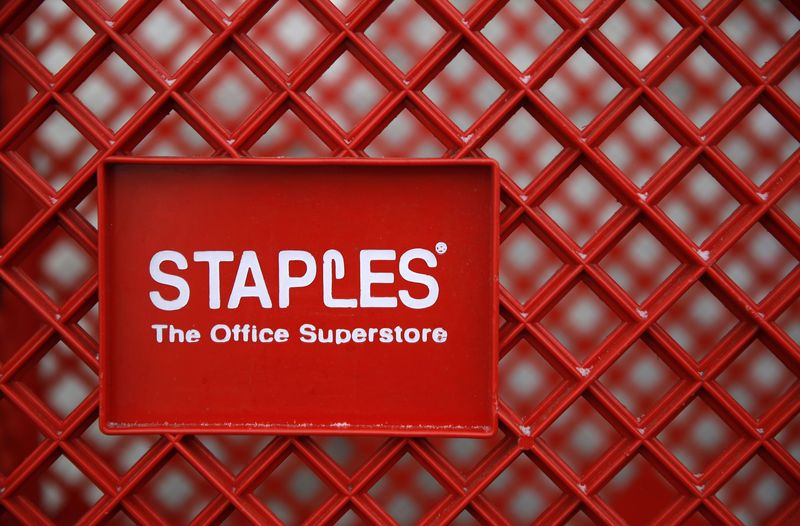Street Calls of the Week
By Yashaswini Swamynathan and Diane Bartz
(Reuters) - Staples Inc (O:SPLS) and Office Depot (O:ODP) should find the second time is a charm as the top two U.S. office supply chains once again test the views of antitrust regulators in the rapidly changing retail landscape, experts said on Wednesday.
Staples, the No. 1 U.S. office supplies retailer, and No. 2 Office Depot Inc announced on Wednesday a $6.3 billion plan to join forces to compete against big box stores and online rivals.
The first time the two agreed to merge -- in 1996 -- the deal was derailed by a government lawsuit that successfully argued the move would have meant higher prices for pens, paper and other office supplies in a long list of U.S. cities.
But this time around the Federal Trade Commission, which is often skeptical of any bid by the top two firms in a sector to hook up, is likely to approve the deal, four antitrust experts said.
"I think there's a fair chance for this deal to be approved," said Seth Bloom, a veteran of the Justice Department's antitrust division who is now in private practice.
Since the failed deal, Amazon (O:AMZN) and other online sellers, which can deliver to almost anywhere, have exploded onto the scene, while megastores like Costco (O:COST) and Wal-Mart Stores Inc (N:WMT) are also crowding the market.
The FTC noted precisely these changes when it approved Office Depot's purchase of No. 3 OfficeMax in November 2013, and seemed to argue that it no longer made sense to have a separate market niche for office superstores, Bloom said.
The FTC required no asset sales in approving that deal.
"The same factors that the FTC cited in the Office Depot OfficeMax deal are present here," Bloom said.
The FTC's review of the new deal, which may take six months or more, will likely focus on whether prices have risen since Office Depot bought OfficeMax, said Michael Keeley, a partner at Washington, D.C. law firm Axinn, Veltrop & Harkrider.
"Unless the FTC finds that prices have gone up as a result of that acquisition, the Staples transaction should have a good chance at clearance as well," Keeley said.
Still, some asset sales could be required to gain approval. Staples said it could call off the deal if authorities ordered divestitures that delivered more than $1.25 billion of Office Depot's 2014 U.S. revenue.
"There are some markets where it could be that the government could require some divestitures," said Jeffrey Jacobovitz of the law firm Arnall Golden Gregory LLP.
Staples' shares fell 12 percent, suggesting investors were concerned about the deal. Office Depot's shares rose 2.2 percent.
Staples will pay $7.25 per share in cash and 0.2188 of its shares for each Office Depot share, a premium of 44 percent to Office Depot's close on Monday before the Wall Street Journal reported that the companies were in talks.
At $16.89, the low of Staples' share price on Wednesday morning, the deal values each Office Depot share at $10.94. Office Depot's stock closed at $9.49.
Brian Yarbrough, an analyst at brokerage Edward Jones, said Staples was paying "a more than fair price" for Office Depot and was taking on a large debt to buy a competitor in a weak market.
Staples said it had secured a $3 billion credit facility and a $2.75 billion six-year term loan financing to fund the deal. It will also suspend its share buyback program.
Barclays is financial adviser to Staples. Legal advisers are Wilmer Cutler Pickering Hale and Dorr LLP and Weil, Gotshal & Manges. Peter J. Solomon Co is financial adviser to Office Depot, whose legal adviser is Simpson Thacher & Bartlett.
